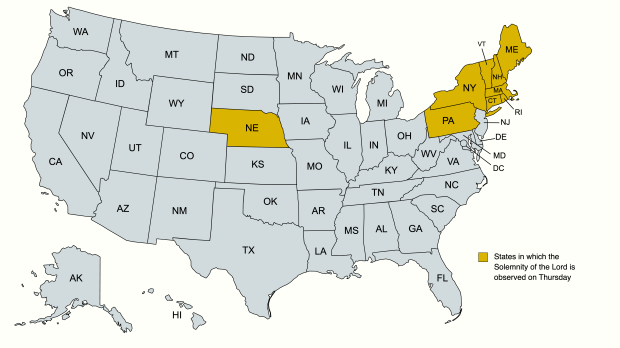Throughout the United States the Solemnity of the Ascension has different observances. Depending on what diocese your state is in, the celebration of the feast might actually fall on different days.
So what’s the deal? How can a feast day fall on different days?
Traditionally the feast is celebrated exactly 40 days after Easter. That’s the origin of “Ascension Thursday.”
Following the liturgical reforms begun by the Second Vatican Council, it became possible for the different national conferences of Catholic bishops to transfer the feast. The “General Norms for the Liturgical Year and the Calendar” – issued in Rome on February 14, 1969 – states:
“In those places where the solemnities of Epiphany, Ascension, and Corpus Christi are not observed as holydays of obligation, they are assigned to a Sunday, which is then considered their proper day in calendar.”
Holy Days of Obligation
In the United States the following six Holy Days of Obligation are observed throughout the country: 1) Solemnity of Mary, Mother of God, 2) Ascension of the Lord, 3) Assumption of the Virgin Mary, 4) All Saints’ Day, 5) Immaculate Conception of the Virgin Mary, 6) Christmas.
You might be surprised to see Easter Sunday, Palm Sunday, and Ash Wednesday missing from the list. Since Easter and Palm Sunday both fall on Sunday, we’re bound by the normal Sunday obligation to attend Mass on those days. The fact that so many people show up for Ash Wednesday without it being “required” is worth further reflection…but we digress.
Decision of the US bishops
In 1991, the US bishops decided to permit different Ecclesiastical Provinces to make the decision to transfer the Solemnity of the Ascension of the Lord to the Seventh Sunday of Easter or to observe the feast on the customary Thursday. (An Ecclesiastical Province is the grouping of dioceses which are set under an archdiocese; the bishops of these dioceses are “headed” by the archbishop, called a “metropolitan bishop”).
In accord with the provisions of canon 1246, §2 of the Code of Canon Law, which states: “… the conference of bishops can abolish certain holy days of obligation or transfer them to a Sunday with prior approval of the Apostolic See,” the National Conference of Catholic Bishops of the United States decrees that the Ecclesiastical Provinces of the United States may transfer the Solemnity of the Ascension of Our Lord and Savior Jesus Christ from Thursday of the Sixth Week of Easter to the Seventh Sunday of Easter according to the following procedure.
Ascension on Thursday
Accordingly, these Ecclesiastical Provinces in the United States have chosen to continue to observe the Solemnity of the Ascension on Thursday: Boston, Hartford, New York, Omaha, and Philadelphia. The decision impacts 9 different U.S. states overall.
After several years of transferring the solemnity to Sunday, in March 2022, the bishops of the Ecclesiastical Provinces of New Jersey decided to transfer the solemnity permanently to Sunday in their respective dioceses.
Additionally the Anglican Ordinariate, the Personal Ordinariate of the Chair of Saint Peter, observes the feast on Thursday, regardless of the geographic location of their parishes.



